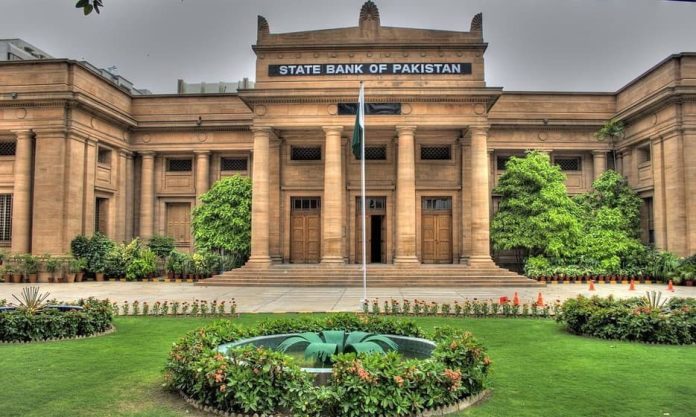- Advertisement -
KARACHI, Apr 24 (APP):State Bank of Pakistan (SBP), Thursday, stated that the financial sector maintained its operational and financial resilience during the year 2024 and registered a decent growth at 17.8 percent amid improved macroeconomic conditions.
It was assessed by the central bank in its annual flagship publication, Financial Stability Review (FSR) for the year 2024, that presents the performance and risk assessment of various segments of the financial sector including banks, microfinance banks, development finance institutions, non-bank financial institutions, insurance, financial markets and financial market infrastructures (FMIs).
The Review highlights “Macroeconomic conditions improved considerably during CY24, as reflected by receding inflationary pressures and consequent significant monetary easing, fiscal consolidation, stable rupee-dollar parity, pick-up in economic activity, and improved external account balance”. In this backdrop, the financial sector, with a 17.8% growth, maintained its operational and financial resilience during the calendar year 2024.
The FSR-24 noted the subsided volatility in financial markets, steady performance by the banking sector that maintained its financial soundness, following turnaround in the macroeconomic environment while the balance sheet of the banks expanded by 15.8 percent in CY24, driven by both investment as well advances.
The Review that also assesses the financial soundness of the non-financial corporate sector, which is a major private sector user of bank credit, highlighted that the non-bank financial sector presented a mixed performance while the balance sheet of DFIs contracted, NBFIs manifested a remarkable expansion and insurance sector continued to perform steadily.
Islamic banking institutions witnessed a strong increase in asset base and a marked expansion in branch network along with contained credit risk, resilience of the Islamic banks remained steady in CY24, while microfinance banks (MFBs) continued to remain under stress.
Private sector advances witnessed a strong rebound, due to revival in economic activity, easing in monetary policy, and advances-to-deposit ratio (ADR) linked tax policy for income from government securities, the Review observed adding that this tax policy also dampened the deposit mobilization, which further increased the banks’ reliance on borrowings.
Anticipating improvement in the repayment capacity of the borrowers due to revival of economic activity, the FSR pointed out that the current level of credit risk of the banking sector also remained within a comfortable range as non-performing loans (NPLs) to gross loans ratio fell to 6.3 percent in December 2024 from 7.6 percent in December 2023.
The earning volume remained steady, while key profitability indicators witnessed moderation over the year, the Review observed, adding that the capital adequacy ratio improved to 20.6% by end December 2024 and remained well above the minimum regulatory requirements.
“Whereas the supply side of the financial sector presented a comfortable position, the demand side was affected by the erstwhile tighter financial conditions and subdued economic activity,” the FSR assessed and observed that the sales of non-financial large corporate sector witnessed pressure and moderation in earnings. However, the liquidity profile and repayment capacity of the sector remained comfortable and credit worthiness and repayment capacity of the large borrowers of the banking sector remained steady during CY24, it added.
The Review highlights that the FMIs continued to support financial system stability through operational resilience and the digital transactions continued to drive the momentum of the retail transactions, the SBP inked a MoU with Arab Monetary Fund (AMF) to enable the integration of Raast with the AMF’s cross border payment system Buna to facilitate and support remittances from the Gulf region.
The Raast maintained the momentum of strong growth which particularly got traction after the introduction of Person-to-Merchant module in late 2023, it added.
The FSR stressed on significance of a continued perceptible progress on structural reforms for sustained economic growth, building of external buffers and reducing external financing risks and highlighted potential challenges amid the recent wave of protectionist measures and its associated implications on global economic growth and financial conditions.
Moreover, results of the latest stress testing assessment of the banking sector reveals that the sector is expected to remain resilient to various severe hypothetical but plausible shocks over the projected horizon of three years and is expected to maintain its compliance with minimum capital adequacy requirements.
SBP, on its part vowed to continue ensuring financial system stability by remaining vigilant to emerging risks and proactively strengthening its regulatory and supervisory regime.

